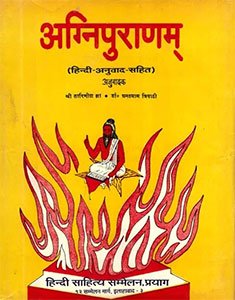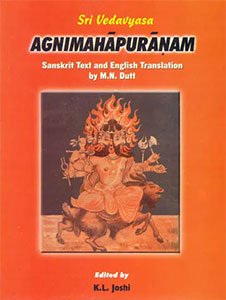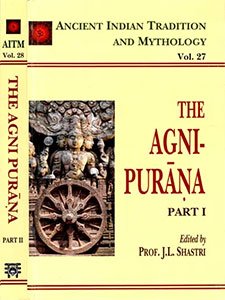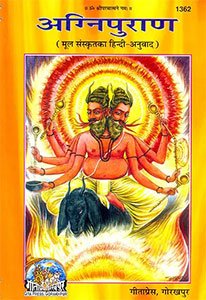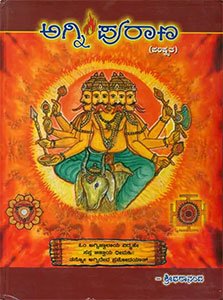Agni Purana [sanskrit]
97,288 words
This Sanskrit edition of the Agnipurana. It is one of the traditional eighteen Mahapuranas presented as an encyclopedia of ancient Indian history and knowledge. It contains either 382 or 383 chapters and over 10.000 verses (Sanskrit Shlokas).
Verse 313.15
ओं नमो भगवति ज्वालामानिनि गृध्रगणपरिवृते स्वाहा ।
युद्ध गच्छन् जपन्मन्त्रं पुमान् साक्षाज्जयी भवेत् ।
ओं श्रीँ ह्रीँ क्लीँ श्रियै नमः ।
उत्तरादौ च घृणिनी सूर्य्या पूज्या चतुर्द्दले ॥ १५ ॥
oṃ namo bhagavati jvālāmānini gṛdhragaṇaparivṛte svāhā |
yuddha gacchan japanmantraṃ pumān sākṣājjayī bhavet |
oṃ śrīṃ hrīṃ klīṃ śriyai namaḥ |
uttarādau ca ghṛṇinī sūryyā pūjyā caturddale || 15 ||
The Sanskrit text of Verse 313.15 is contained in the book The Agni Puranam (Anandashram Edition) by Shri Chimna Apate (श्री चिमणा आपटे). This book is available online or you could buy the latest edition:
Read online Buy now! The Sanskrit text by Shri Chimna Apate (श्री चिमणा आपटे) (1987)
Glossary of Sanskrit terms
Note: This extracts Sanskrit terms and links to English definitions from the glossary, based on an experimental segmentation of verse (313.15). Some terms could be superfluous while some might not be mentioned. Click on the word to show English definitions.
Nama, Namas, Bhagavat, Bhagavati, Jvala, Gridhra, Ganapa, Vrit, Vrita, Vriti, Svaha, Yuddha, Gacchat, Japat, Mantra, Pums, Shri, Hrim, Uttara, Ada, Ghrini, Ghrinin, Ghrinini, Pujya,
Analysis of Sanskrit grammar
Note: this is an experimental feature and only shows the first possible analysis of the Sanskrit text (Verse 313.15). If the system was successful in segmenting the sentence, you will see of which words it is made up of, generally consisting of Nouns, Pronouns, Verbs, Participles and Indeclinables. Click on the link to show all possible derivations of the word.
- Line 1: “oṃ namo bhagavati jvālāmānini gṛdhragaṇaparivṛte svāhā ”
- Cannot analyse om*na
- namo* -
-
namas (noun, masculine)[compound], [vocative single]namas (noun, neuter)[compound], [nominative single], [vocative single], [accusative single]nama (noun, masculine)[nominative single]
- bhagavati -
-
bhagavatī (noun, feminine)[adverb], [vocative single]bhagavat (noun, masculine)[locative single]bhagavat (noun, neuter)[locative single]
- jvālām -
-
jvālā (noun, feminine)[accusative single]
- āni -
-
- ni -
-
ni (noun, masculine)[compound], [adverb]ni (noun, neuter)[compound], [adverb], [nominative single], [vocative single], [accusative single]ni (noun, feminine)[compound], [adverb]nī (noun, masculine)[adverb]nī (noun, neuter)[compound], [adverb], [nominative single], [vocative single], [accusative single]nī (noun, feminine)[adverb]
- gṛdhra -
-
gṛdhra (noun, masculine)[compound], [vocative single]gṛdhra (noun, neuter)[compound], [vocative single]
- gaṇapa -
-
gaṇapa (noun, masculine)[compound], [vocative single]
- ri -
-
rī (noun, feminine)[adverb]rai (noun, masculine)[adverb]
- vṛte -
-
vṛt (noun, masculine)[dative single]vṛt (noun, neuter)[dative single]vṛta (noun, masculine)[locative single]vṛta (noun, neuter)[nominative dual], [vocative dual], [accusative dual], [locative single]vṛtā (noun, feminine)[nominative dual], [vocative single], [vocative dual], [accusative dual]vṛti (noun, feminine)[vocative single]√vṛ -> vṛta (participle, masculine)[locative single from √vṛ class 1 verb], [locative single from √vṛ class 5 verb], [locative single from √vṛ class 9 verb]√vṛ -> vṛta (participle, neuter)[nominative dual from √vṛ class 1 verb], [vocative dual from √vṛ class 1 verb], [accusative dual from √vṛ class 1 verb], [locative single from √vṛ class 1 verb], [nominative dual from √vṛ class 5 verb], [vocative dual from √vṛ class 5 verb], [accusative dual from √vṛ class 5 verb], [locative single from √vṛ class 5 verb], [nominative dual from √vṛ class 9 verb], [vocative dual from √vṛ class 9 verb], [accusative dual from √vṛ class 9 verb], [locative single from √vṛ class 9 verb]√vṛ -> vṛtā (participle, feminine)[nominative dual from √vṛ class 1 verb], [vocative single from √vṛ class 1 verb], [vocative dual from √vṛ class 1 verb], [accusative dual from √vṛ class 1 verb], [nominative dual from √vṛ class 5 verb], [vocative single from √vṛ class 5 verb], [vocative dual from √vṛ class 5 verb], [accusative dual from √vṛ class 5 verb], [nominative dual from √vṛ class 9 verb], [vocative single from √vṛ class 9 verb], [vocative dual from √vṛ class 9 verb], [accusative dual from √vṛ class 9 verb]√vṛ -> vṛta (participle, masculine)[locative single from √vṛ class 5 verb], [locative single from √vṛ class 9 verb]√vṛ -> vṛta (participle, neuter)[nominative dual from √vṛ class 5 verb], [vocative dual from √vṛ class 5 verb], [accusative dual from √vṛ class 5 verb], [locative single from √vṛ class 5 verb], [nominative dual from √vṛ class 9 verb], [vocative dual from √vṛ class 9 verb], [accusative dual from √vṛ class 9 verb], [locative single from √vṛ class 9 verb]√vṛ -> vṛtā (participle, feminine)[nominative dual from √vṛ class 5 verb], [vocative single from √vṛ class 5 verb], [vocative dual from √vṛ class 5 verb], [accusative dual from √vṛ class 5 verb], [nominative dual from √vṛ class 9 verb], [vocative single from √vṛ class 9 verb], [vocative dual from √vṛ class 9 verb], [accusative dual from √vṛ class 9 verb]
- svāhā -
-
svāhā (indeclinable)[indeclinable]svāhā (noun, feminine)[nominative single]
- Line 2: “yuddha gacchan japanmantraṃ pumān sākṣājjayī bhavet ”
- yuddha -
-
yuddha (noun, masculine)[compound], [vocative single]yuddha (noun, neuter)[compound], [vocative single]√yudh -> yuddha (participle, masculine)[vocative single from √yudh class 1 verb], [vocative single from √yudh class 4 verb]√yudh -> yuddha (participle, neuter)[vocative single from √yudh class 1 verb], [vocative single from √yudh class 4 verb]
- gacchan -
-
gacchat (noun, masculine)[nominative single], [vocative single]
- japan -
-
√jap -> japat (participle, masculine)[nominative single from √jap class 1 verb], [vocative single from √jap class 1 verb]√jap -> japat (participle, neuter)[nominative single from √jap class 1 verb], [vocative single from √jap class 1 verb], [accusative single from √jap class 1 verb]
- mantram -
-
mantra (noun, masculine)[adverb], [accusative single]mantrā (noun, feminine)[adverb]
- pumān -
-
puṃs (noun, masculine)[nominative single]
- Cannot analyse sākṣājjayī*bh
- bhavet -
-
√bhū (verb class 1)[optative active third single]
- Line 3: “oṃ śrīṃ hrīṃ klīṃ śriyai namaḥ ”
- Cannot analyse om*śr
- śrīm -
-
śrī (noun, feminine)[accusative single]
- hrīm -
-
hrīm (indeclinable)[indeclinable]
- Cannot analyse klīm*śr
- śriyai -
-
śrī (noun, feminine)[dative single]śrī (noun, masculine)[dative single]
- namaḥ -
-
namas (noun, masculine)[compound], [vocative single]namas (noun, neuter)[compound], [nominative single], [vocative single], [accusative single]nama (noun, masculine)[nominative single]
- Line 4: “uttarādau ca ghṛṇinī sūryyā pūjyā caturddale ”
- uttarā -
-
uttarā (indeclinable)[indeclinable]uttara (noun, neuter)[compound], [vocative single]uttara (noun, masculine)[vocative single]uttarā (noun, feminine)[nominative single]
- adau -
-
ada (noun, masculine)[nominative dual], [vocative dual], [accusative dual]ad (noun, masculine)[nominative dual], [vocative dual], [accusative dual]
- ca -
-
ca (indeclinable conjunction)[indeclinable conjunction]ca (noun, masculine)[compound], [vocative single]ca (noun, neuter)[compound], [vocative single]
- ghṛṇinī -
-
ghṛṇinī (noun, feminine)[compound], [nominative single]ghṛṇi (noun, neuter)[nominative dual], [vocative dual], [accusative dual]ghṛṇin (noun, neuter)[nominative dual], [vocative dual], [accusative dual]
- Cannot analyse sūryyā*pū
- pūjyā -
-
pūjyā (noun, feminine)[nominative single]√pūj -> pūjyā (participle, feminine)[nominative single from √pūj class 10 verb]
- Cannot analyse caturddale
Other editions:
Also see the following editions of the Sanskrit text or (alternative) English translations of the Verse 313.15
Agni Purana with Hindi Translation
by Tarinish Jha and Dr. Ghanshayam Tripathi (तारिणीश् झा और डॉ. घनश्याम त्रिपाठी) (2007)
Publisher: Hindi Sahitya Sammelan, Allahabad; 1199 pages; Title: अग्निपुराणम् (संस्कृत एवं हिन्दी अनुवाद);
Buy now!
Agni Purana (Two Volumes)
by M. N. Dutt (2023)
Publisher: Parimal Publication Pvt. Ltd.; Editor: K. L. Joshi.; ISBN-10: 8171101690; ISBN-13: 9788171101696; 1070 pages.
Buy now!
Agni-Purana (Set of 4 Volumes)
by N. Gangadharan (2006)
Publisher: Motilal Banarsidass Publishers Pvt. Ltd.; ISBN: Part I 8120803590 (9788120803596); Part II 8120803604 (9788120803602); Part III 8120801741 (9788120801745); Part IV 812080306X (9788120803060); 1271 pages.
Buy now!
The Agni Purana (Hindi)
by (2013)
Publisher: Gita Press, Gorakhpur; Title: अग्निपुराण (केवल हिन्दी अनुवाद); ISBN-10: 8129302934; ISBN-13: 9788129302939; 848 pages.
Buy now!
Agni Purana (Kannada)
by Sreedharananda (2013)
Publisher: Pooja Pusthaka Bhandara, Bangalore; Title: ಅಗ್ನಿ ಪುರಾಣ; 560 pages.
Buy now!Preview of verse 313.15 in Kannada sript:
ಓಂ ನಮೋ ಭಗವತಿ ಜ್ವಾಲಾಮಾನಿನಿ ಗೃಧ್ರಗಣಪರಿವೃತೇ ಸ್ವಾಹಾ ।
ಯುದ್ಧ ಗಚ್ಛನ್ ಜಪನ್ಮನ್ತ್ರಂ ಪುಮಾನ್ ಸಾಕ್ಷಾಜ್ಜಯೀ ಭವೇತ್ ।
ಓಂ ಶ್ರೀಂ ಹ್ರೀಂ ಕ್ಲೀಂ ಶ್ರಿಯೈ ನಮಃ ।
ಉತ್ತರಾದೌ ಚ ಘೃಣಿನೀ ಸೂರ್ಯ್ಯಾ ಪೂಜ್ಯಾ ಚತುರ್ದ್ದಲೇ ॥ ೧೫ ॥
![Agni Purana [sanskrit] - book cover](/uploads/a/Agni-Purana-Sanskrit.jpg)
